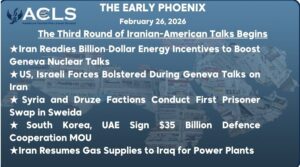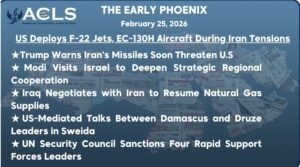A Weekly Analysis of the Region’s Most Important Events
April 17, 2023
This week the Middle East saw several events that seemed to undermine the US-led regional security order and signal further turmoil and conflict. This weekend, an unprecedented battle broke out in Khartoum between the top two Sudanese military leaders. Iran extended its ballyhooed peace deal with the Arabs while preparing for an expanded war with Israel. And Arab leaders drifted further away from U.S. leadership toward new partnerships with China, Russia, and Iran.
By Rania Kisar and Joel Rayburn
- Power Struggle Leads Sudan To War
Sudan’s recent catastrophic power struggle has escalated to unprecedented levels, causing the country’s collapse, according to the Former US Assistant Secretary of State for African Affairs, David Shinn.
During a public event with various political parties, Abdel Fattah Al-Burhan, Chairman of the Transitional Sovereignty Council and Commander-in-Chief of the Army, suggested that all parties, including himself, step aside. Many observers interpreted this as an implicit refusal to place the army command under civilian control during the transitional period, fueling skepticism about Al-Burhan’s intentions to relinquish power.
A lingering dispute over the subordination of the Rapid Support Forces (RSF) to the Sovereignty Council was meant to be resolved at a meeting on Sunday between Al-Burhan and his deputy, Hamdan Dagalo (also known as Hemedti), who controls the RSF. The army called for Hemedti’s RSF to merge with the regular forces under a single command, which would direct the movements and deployment of troops within 24 months. Hemedti accused unnamed military officials of plotting to remain in power, while the RSF demanded that its officers receive equal privileges to their army counterparts.
On Saturday morning, the RSF attacked the Republican Palace in Khartoum. By mid-afternoon, they claimed to have seized control of the Khartoum and Marawi airports, the palace, a guest house, and various locations in nine Sudanese states. However, the General Command Armed Forces soon denied these claims.
Arabic media reported the first sightings of military planes flying over Khartoum in the early afternoon, with the army asserting control over all bases and airports. A Saudi civilian aircraft was hit during the airport clashes. Chad closed its land borders with Sudan, while Ethiopia called for restraint. The Sudanese army declared that it would not engage in negotiation or dialogue until the RSF was disbanded, branding it a rebel militia. Despite international and Arab efforts to broker peace between Al-Burhan and Hamedti, heavy clashes continued overnight.
By Monday morning, the death toll had exceeded 100, with over 600 injured. By the early evening, the toll rose further, with at least 83 additional people killed. An RSF political advisor claimed to Arabic media that the RSF controlled over 90% of Khartoum and had taken over radio and television stations, which Reuters confirmed during Sunday’s skirmishes. The Sudanese army announced that it had regained control of the Marawi airport and resumed official television broadcasts, asserting that they had previously been hacked.
The RSF claimed the day’s clashes involved the downing of three fighter jets, the destruction of over 200 tanks, and the arrest of the army’s director of the Institute of Intelligence. Another civilian plane, this time Egyptian, was destroyed on the second day of fighting (Sudan, moment by moment report, Al Jazeera).
Recent satellite images revealed the extent of the damage to Khartoum International Airport, with two planes on fire and flames engulfing the burning aircraft. Other photos showed damage to the General Command of the Sudanese Armed Forces building, the Security Service Presidency, and the Ministry of Defense, as well as smoke rising from other structures in Khartoum.
Due to significant contradictions between the narratives of the army and the RSF, the outcome and the reality of the security situation in Sudan remain unclear. Several Arab experts specializing in Sudanese affairs have described the situation as a zero-sum game and proposed three possible scenarios for the country. The first scenario envisions the army leveraging its superior power to eliminate RSF leaders within days. The second scenario involves the RSF achieving a surprise victory by neutralizing the army leadership. The most likely scenario, however, sees Hemedti, the RSF leader, withdrawing his forces from Khartoum to a region that allows him greater freedom of movement.
The Sudanese people remain neutral in this conflict but have called upon the army leaders to transfer power to civilians, stating that this is the only decision they will accept.
2. Syria: U.S. Hands-Off Approach Leads to Arab “Normalization” Outreach to Assad, but Little Prospect of Assad and His Narco-State Actually Behaving “Normally”
In the Gulf, the Chinese-brokered deal between Iran and Saudi Arabia mainly addressed ending the war in Yemen, but it has also offered Assad his best political opportunity in years, especially after Russia, Turkey, and Iran essentially used their so-called Astana Group forum to steer the long-running UN-brokered political transition into a stalemate. The absence of the West as a counterweight in the Syrian political track has greatly benefited Assad, especially after the Biden administration, following the devastating February 6th earthquake, placed a six-month moratorium on sanctions on Assad’s financial sector. Across the Middle East, this move by the U.S. administration was interpreted as a green light for the normalization initiatives that have accelerated since then.
Nevertheless, the Chinese, Russian, and Iranian plans to gradually enforce the normalization and legitimacy of the Assad regime faced challenges last week after at least five Arab countries refused his return to the Arab League, this time because Assad refused to guarantee specific steps concerning humanitarian aid and refugees.
At virtually the same time, the Russian-brokered normalization efforts between Assad and Turkey also hit a snag, as Assad’s representatives demanded the first item of discussion to be the withdrawal of Turkish forces from northern Syria, a demand that angered the Turkish government. Russian foreign minister Sergei Sergei Lavrov had to travel to Turkey for two days to address the Turkish backlash following the initial meetings between the Turks and Assad’s representatives. Lavrov later announced that meetings between the Assad regime and Turkey should not be based on preconditions.
On April 13, Saudi foreign minister Faisal Bin Farhan hosted Faisal Miqdad, Assad’s foreign affairs minister, after twelve years of severed relations. The Kingdom’s decision to reopen relations with Assad came as part of a broader Saudi agenda of settling other regional accounts, as evidenced in the effort to end the war in Yemen. But the fact that Saudi officials seized 3.6 million smuggled Captagon pills on the same day Farhan hosted Miqdad raises questions about Riyadh’s ability to combat the narco-state that the Assad regime has become. The French newspaper Le Monde explained that it would not be difficult for Bashar al-Assad, who initiated terrorism in Syria and Iraq while simultaneously advertising himself to the world as the only bulwark against the terrorism he himself was conducting, to similarly delude the world into viewing him as indispensable in battling the drug trade that he himself is leading.
The joint Saudi-Assad statement issued during Miqdad’s visit signals that the normalization process between them is doomed to failure because “the necessary steps” discussed between the two to end Assad’s isolation are not only unfavorable to Assad but virtually impossible for him to achieve even if he were interested in doing so. Resolving the humanitarian siege on Syrian communities and providing the appropriate environment for aid to reach all regions, creating the conditions to enable the safe return of refugees, and taking more measures that would contribute to the stability of the entire country were some of the steps the Saudis discussed with Miqdad. However, resolving the humanitarian siege created by Russia’s vetoes at the United Nations Security Council would weaken Assad’s political leverage on Syrians who oppose his rule. Meanwhile, creating the conditions to enable the safe return of refugees would require billions of dollars in reconstruction costs, which the regime claims not to have, but more importantly, would require lifting the iron-grip killing machine the regime has imposed on Syria since 2011.
In reality, Assad gains more benefits and revenue from his Captagon cartel than Saudi Arabia and the other Arab states can ever provide as incentives, and therefore Assad has no interest in taking any of the measures the Arab capitals want him to take to contribute to the stability of Syria.
The leaked conversations among the Arab foreign ministers who met in Jeddah the day after Miqdad’s visit indicated that Arab officials who met with Assad and his entourage have come to this same conclusion. They reportedly said at the ministerial meeting that no benefit would come out of legitimizing “a Captagon Cartel government” that behaves as a predator while also coming close to demanding an “Arab apology” for having aided the Syrian opposition in the first place.
The joint statement issued at the end of the Arab foreign ministers meeting in Jedda reiterated that only a political solution is viable in Syria and called upon Assad to end the presence of armed militias and external interference in Syria’s internal affairs. The statement added that Assad must combat Captagon manufacturing and trafficking out of Syria. The fact that the joint statement of the Arab leaders’ meeting did not mention an agreement to invite Assad to the Arab League summit, which will take place in May, corroborates the leaked discussions between the attendees reported by the Financial Times.
- The United States May No Longer Be the Region’s Security Convenor
A little too late in trying to catch a fast-moving train headed in the opposite direction of American and allied interests, the Biden administration initiated high-level communications with the Saudi government in the wake of last month’s Chinese-brokered deal between Riyadh and Iran. The administration sent controversial US National Security Council Coordinator for the Middle East and North Africa, Brett McGurk, to Riyadh on April 14 to discuss how to repair US-Saudi disagreements, but the following day, the news broke that the Saudis will host a HAMAS delegation soon and have already released several HAMAS detainees. Iran and Saudi Arabia also announced the lifting of travel bans and the reopening of embassies.
Iran’s ambitions from the China-brokered deal with the regional financial and economic powerhouse, Saudi Arabia, extend beyond just the restoration of diplomatic services, encompassing regional trade opportunities and even a regional strategic realignment against Tehran’s foes. Emboldened by the restoration of diplomatic relations mediated by China, Tehran sees itself as no longer isolated in the region and called for a united Muslim front against Israel this week. Using Syrian territory to launch attacks on Israel, Ismail Qaani, Qassim Soleimani’s successor and the “new nightmare maker for Israel,” held meetings in Syria, Lebanon, and Iraq to coordinate more attacks on Israel and recruit new fighters.
Following the escalation of Israeli attacks against Iran in Syria, Qaani moved the headquarters of secret meetings to Beirut, indicating that Iran is not showing any signs of backing down from its strategy. It is becoming more likely that these secret meetings will produce further escalations.
On Friday, April 14, 2023, the Iranian regime celebrated a lackluster Quds Day, during which several clerics and military commanders made remarks about the demise of Israel. The spokesman of the IRGC, Ramazan Sharif, said the United States is not in a position to support Israel and knows that if Israel takes action against Iran, then the “in-kind retaliation will engulf the bases of those supporting them.” Deputy IRGC commander for political affairs, General Yadollah Javani, said Israel should be wiped off the map, stressing that this will materialize and the Jewish people must return to their home countries. The Palestinian Quds Brigade, the military wing of the Islamic Jihad Movement, also held a large celebration of Quds Day in the Yarmouk camp in Damascus, Syria, the same neighborhood where Assad killed and displaced hundreds of thousands of Palestinians for years. Israel had to close its airspace with Lebanon, Syria, and Gaza in anticipation of missile strikes during the Iranian Quds Day activities in those areas.
Prime Minister Netanyahu said on Sunday that “Israel must always be able to defend itself with its own military. If superpowers want to mobilize to help, that is good, but we cannot build our national security on the foundations of others.” Israeli Defense Minister Yoav Gallant also warned, “Iran is waging a multi-front war of attrition against the State of Israel.”



